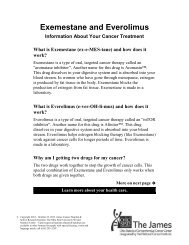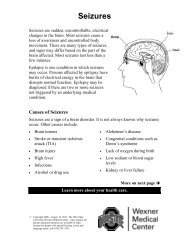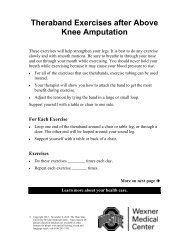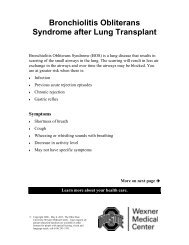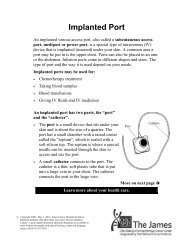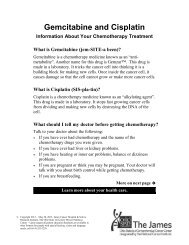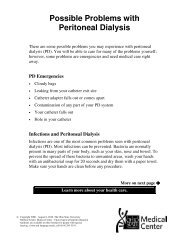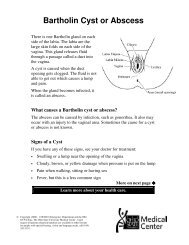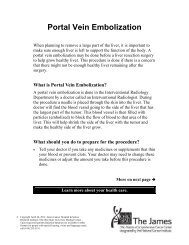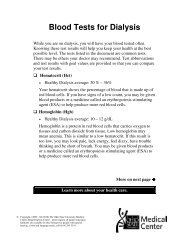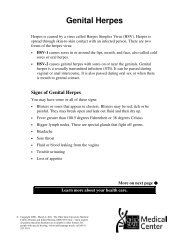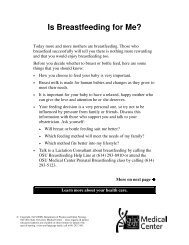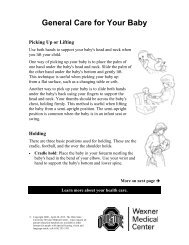Schizophrenia - Patient Education Home
Schizophrenia - Patient Education Home
Schizophrenia - Patient Education Home
Create successful ePaper yourself
Turn your PDF publications into a flip-book with our unique Google optimized e-Paper software.
Definition:<br />
<strong>Schizophrenia</strong><br />
<strong>Schizophrenia</strong> an illnesses that usually starts during childhood or teenage years.<br />
It can cause a change in:<br />
C Thinking<br />
C The way you understand what you see, hear, feel, taste and smell<br />
C Mood or feelings<br />
C Self image<br />
C Relationships with other people<br />
C Ability to make decisions<br />
C Body movements<br />
General information<br />
There are several types of <strong>Schizophrenia</strong>. The kind you have depends on your<br />
symptoms. The different kinds of schizophrenia are:<br />
C Catatonic Type<br />
C Disorganized Type<br />
C Undifferentiated Type<br />
C Residual Type<br />
C Paranoid Type<br />
<strong>Schizophrenia</strong> does not mean split personality.<br />
Signs and symptoms:<br />
1. Changes in thinking, which may include:<br />
C Thoughts that jump from one subject to another quickly.<br />
C Thoughts that are not connected and do not make sense to other people.<br />
C Having fewer thoughts or less thoughts that you talk about.<br />
Changes in your thinking also may include delusional thinking. Delusions are<br />
believing things that are not true or real, but are very real to you. Some<br />
common examples of this are:<br />
C Believing that others are talking about you or want to harm you.<br />
C Believing events have a special meaning for you.<br />
C Believing that other people can hear or know your thoughts.
C Believing that someone else's thoughts have been put into your mind.<br />
C Believing that your thoughts have been removed from your head.<br />
C Believing that you are being controlled.<br />
Page 2<br />
2. Changes in the way you understand what you hear and see. This means<br />
hearing or seeing something that is not real. These sensations may seem very<br />
real to you. They are called hallucinations and are different from delusions.<br />
3. Changes in mood or feelings. Many times you may show few or no feelings.<br />
Sometimes you may show feelings that do not make sense to others, such as<br />
laughing at something sad or crying over something funny.<br />
4. Changes in your self image. You may not have a clear feeling or idea of who<br />
you are as a person.<br />
5. Ability to make decisions. You may have trouble setting goals and making<br />
choices. You may have less energy, interest or desire. This may keep you<br />
from working or getting things done.<br />
6. Changes in relationships with other people. You may have trouble relating to<br />
other people. You may withdraw from other people and have trouble<br />
communicating. Sometimes you may depend on others too much.<br />
7. Changes in body movements. Sometimes you may not move, or you may<br />
move slowly. Occasionally you may have movements that you can not<br />
control. Sometimes you might hold your body in strange positions.<br />
Course and treatment:<br />
The usual course of schizophrenia includes periods of being sick (having<br />
symptoms) followed by periods of being well (without symptoms). During the<br />
well times you may not be able to function at the same level as before you became<br />
sick.<br />
There is no cure for schizophrenia. Sometimes the symptoms of schizophrenia<br />
leave completely, especially if you follow your medical and treatment program. A<br />
lot of research is being done about schizophrenia and new drugs such as Clozaril<br />
are being developed.<br />
Things you can do to help yourself:<br />
C Tell your doctor if any of your symptoms become worse or if new symptoms<br />
occur. Know what your symptoms are and how to get help.<br />
C It is very important to take all of your medicine the way your doctor tells you<br />
to, and to keep taking your medicine even when your symptoms are gone.<br />
Medicine can help most or all of the symptoms of schizophrenia.<br />
C Eat well and get enough rest.
C Talk about your thoughts and feelings instead of keeping them inside.<br />
C Keep your appointments with your doctor.<br />
C Realize when there is stress in your life and learn ways to cope with stress.<br />
C Do not drink alcohol or take medicine without talking to your doctor first.<br />
Page 3<br />
C Illegal drugs, especially marijuana, diet pills and even over-the-counter cold<br />
medicines can bring on or make schizophrenic symptoms worse.<br />
C Join a support group.<br />
Things family members can do to help:<br />
1. Learn about schizophrenia. Understand that having the illness is neither the<br />
person nor the family's fault.<br />
2. Know what your family member's symptoms are and how to get help if they<br />
get worse or new symptoms occur.<br />
3. Keep expectations realistic.<br />
4. Do not argue about delusions. Try to focus on reality based topics like current<br />
events and day to day things.<br />
5. Help provide a simple routine with few changes.<br />
6. Understand that people with schizophrenia like to be with people but also<br />
need time to be alone. Often they are uncomfortable in groups, even if they<br />
know the people.<br />
7. Behave naturally and with respect toward the person with schizophrenia.<br />
8. Understand that people with schizophrenia do not always understand humor.<br />
9. Join a support group for family members of people with schizophrenia<br />
If you would like more written information, please call the Library for Health Information<br />
at (614)293-3707. You can also make the request by e-mail: health-info@osu.edu.<br />
© Copyright, (10/2004)<br />
Department of Psychiatric Nursing<br />
The Ohio State University Medical Center<br />
< Upon request all patient education handouts are available in other formats for people with special<br />
hearing, vision and language needs, call (614) 293-3191.



